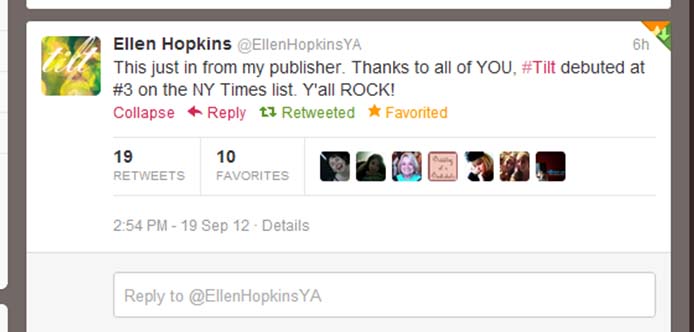We love Banned Books here at For Those Who Know (so much that we’re doing a giveaway!). To help us celebrate Banned Books Week in style we caught up with the YA verse novel world’s Commander in Chief, Ellen Hopkins, to give us her thoughts about being “banned”.
FTWK: You’ve appeared on the “Most Challenged Books List” several times. How did you react when you first learned you’d made the list?
Ellen Hopkins: By the time I made the “Top Ten” most challenged list, I’d learned of several challenges to my books, so it wasn’t really a surprise. I will say, however, that when I first heard that my books had been challenged, it shocked me. I don’t remember ever having someone tell me what I could or couldn’t read. Not my own parents, or teachers or librarians. The idea that some random person could try to decide what others could read felt rather Draconian, and still does. My generation fought for certain rights, including civil and equal and most definitely first amendment rights. This is decades later. How have we not come farther?
FTWK: According to the ALA there are nearly three times as many challenges for “sexually explicit” as for “violence”. What do you think this says about our society?
 EH: It says a lot, doesn’t it? Why are people so afraid of giving their kids necessary information that might prevent an unwanted pregnancy or disease? But they’re not worried about the violent nature of video games or movies or books because…? Our young people are being desensitized to violence, and it’s showing.
EH: It says a lot, doesn’t it? Why are people so afraid of giving their kids necessary information that might prevent an unwanted pregnancy or disease? But they’re not worried about the violent nature of video games or movies or books because…? Our young people are being desensitized to violence, and it’s showing.
FTWK:Most challenges come from parents and are aimed at schools or school libraries. What is a parent’s role in determining what their child reads at school? How old would your own children need to be before you’d want them to read your books?
EH: I think parents should know what their children are reading, and if they truly object, they should tell their kids why, rather than summarily removing a book from their possession. As for my books, it really depends on the reader. Each child’s realm of experience is so different. And as for my own kids, I would have been happy for them to read my books at twelve, if they were so inclined.
FTWK: Bonus Question! I once complained to a librarian about a book called ‘My First Book of Science’ which was shelved in the kids’ science section but was blatantly a religious/creationist text. I didn’t want it removed, only re-shelved. Under what circumstance might you feel like challenging a book?
 EH: Um. How about if the writing sucks? No, not really. I might challenge a book in a school (not public) library if it advocated violent anarchy, especially if it gave a recipe for the tools. I’m not saying the book shouldn’t be available at all, just not in a place where young, emotion-driven adults could have too easy access to “Pipe Bombs 101.” So what’s the difference between that and my books? First, mine are fiction, not instruction manuals. And, second, my books illustrate outcomes to choices. The Anarchist’s Cookbook does not.
EH: Um. How about if the writing sucks? No, not really. I might challenge a book in a school (not public) library if it advocated violent anarchy, especially if it gave a recipe for the tools. I’m not saying the book shouldn’t be available at all, just not in a place where young, emotion-driven adults could have too easy access to “Pipe Bombs 101.” So what’s the difference between that and my books? First, mine are fiction, not instruction manuals. And, second, my books illustrate outcomes to choices. The Anarchist’s Cookbook does not.
That’s funny because I was just talking with my husband and his cousin about all the explosions and mayhem they concocted as teens. I do think we have to be conscious of the sometimes dangerous messages that young people get from books, especially young men, who are so prone to such catastrophic mistakes. (see my post on Angelhorn, I ♥ Broken Boys for more on this)
Thanks so much for your thoughts, Ellen. Here’s to another year on the Most Challenged List. I hope to make the list one day myself. Given that the plot of my verse novel AUDACIOUS hinges on the C word, I think I have a pretty good chance! And don’t forget to enter to win Sonya Sones’s WHAT MY MOTHER DOESN’T KNOW in our Banned Books Week Giveaway.






























 KARMA
KARMA
 There are many ways young people try to harm themselves, and many reasons too. The below books offer a glimpse into some of these stories of cutting, eating disorders, and of course, suicide. Rather than explore suicide from the point of view of the survivors (those stories are categorized below under “death”) these verse novels are more about suicidal ideation and it’s many devastating consequences on a teenagers psyche.
There are many ways young people try to harm themselves, and many reasons too. The below books offer a glimpse into some of these stories of cutting, eating disorders, and of course, suicide. Rather than explore suicide from the point of view of the survivors (those stories are categorized below under “death”) these verse novels are more about suicidal ideation and it’s many devastating consequences on a teenagers psyche.
 As far as teen sex goes, while this is often an edgy issue, it doesn’t necessarily need to be dark.
As far as teen sex goes, while this is often an edgy issue, it doesn’t necessarily need to be dark. 


